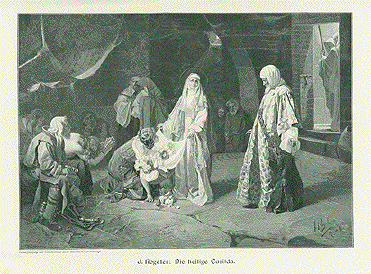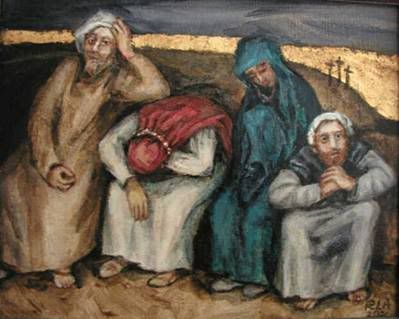 Today, April 9, we celebrate he feast day of Saint Casilda of Toledo (approximately 950-1050). While little is known about Saint Casilda, what we do know is inspirational—especially at a time when both inter and intra-religion conflicts continue to exist. The life of Saint Casilda reminds us that the Lord calls us to love and acceptance of all people, and challenges us to open our hearts to those we disagree with or do not understand.
Today, April 9, we celebrate he feast day of Saint Casilda of Toledo (approximately 950-1050). While little is known about Saint Casilda, what we do know is inspirational—especially at a time when both inter and intra-religion conflicts continue to exist. The life of Saint Casilda reminds us that the Lord calls us to love and acceptance of all people, and challenges us to open our hearts to those we disagree with or do not understand.
As a young woman, Saint Casilda fell ill, likely from a hemorrhagic fever common at the time, for which there was no cure. She refused the assistance of the best Muslim physicians, and instead, traveled down the Iberian Peninsula to the Shrine of San Vicente, known for it’s healing waters and miraculous cures. There, through her faith and holiness, she was cured of her illness, and later baptized into Christianity.
 Saint Casilda lived the remainder of her life as an anchoress (until she reached the age of 100!) in quiet penance and solitude, contemplating the wonder of God, and praying for those on earth. She died peacefully, having served her creator well while practicing two faiths on earth.
Saint Casilda lived the remainder of her life as an anchoress (until she reached the age of 100!) in quiet penance and solitude, contemplating the wonder of God, and praying for those on earth. She died peacefully, having served her creator well while practicing two faiths on earth.Saint Casilda reminds us of the divides that exist between religions today (as well as within our own Church), and models for us the simple love and acceptance of others that the Lord calls us to. Rather than judge the imprisoned Christians, she brought them food. Rather than return to her family and argue with them about their faith, she chose to avoid the conflict, praying for them from afar. How often do we seek our arguments? How often do we judge members of our own and other faith communities? How might we better serve the Lord and draw others to Him through the practice of love, charity, and acceptance?
Prayer Requests: April
During this week, please join me in lifting the following intentions submitted through this blog, to Our Lord and Savior, through the intercession of Our Blessed Mother:
Healing of a husband with severe anxiety (M,
USA-MA); Safe and affordable housing,
financial freedom (K, USA-MD); Healing of a husband and son, protection for a
family (M, USA-ME); End to depression
(K, USA-FL); Protection of those in danger, blessings upon family and friends
(J, Spain); Security in employment (M, USA-WA); Blessings upon estranged
couple, healing after separation (S, India); For continued success as a tutor
(E, Malaysia); Healing of a relationship (P, USA-WA); Healing of a family (M,
USA-CA); True conversion, hearts of love and support for those we don’t
understand (P, USA-OH); To find a God-given partner (N, India); Blessings upon
a marriage (K, Australia); Financial security (D, Bulgaria); Return of a family
to the Catholic Church (P, Botswana); Success of a seminarian (S, Uganda);
Healing of a brother, financial security (C, USA-IL); For occupational success,
for health, for the grace of a God-given partner (K, USA-CA); Healing of a
family, end to addiction, conversion of faith (C, Australia); Financial security (P, India); For a
grandson’s successful employment and financial security, peace within a family
(J, USA-PA); God-fearing partner, health, financial security (C, Philippines);
Successful employment (J, United Arab Emirates); Successful employment (R,
USA-CA); Blessings and protection upon a family, successful employment (R,
USA-NY); Academic success, passing of examinations (M, Germany); Healing (R,
USA-NM); Successful conception (C, United Arab Emirates); Daughter’s academic
success (L, USA-FL); Blessings, healing, and strength (G, Nepal); Blessings,
healing, and protection upon a family (J, India); Successful employment (Y,
Philippines); Successful employment, end to depression (C, Hong Kong); Financial
security (P, Australia).

































